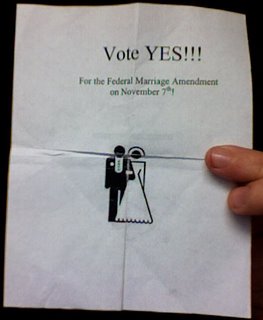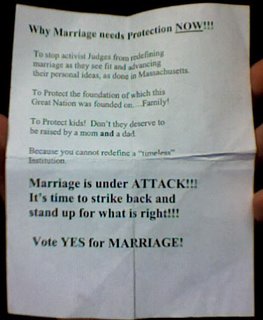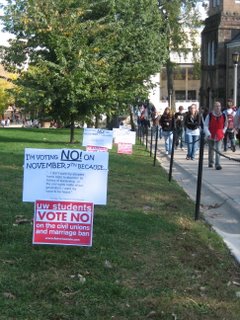In case you didn't
hear,
The Federalist Society at the
University of Wisconsin-Madison Law School sponsored a debate tonight on the proposed ban on gay marriage and civil unions.
University of Wisconsin-Madison Political Science
Professor Howard Schweber argued the "no" side, while Alliance Defense Fund
Attorney Jordan Lorence argued the "yes" side.
We decided to live-blog tonight's debate.
Professor Schweber focused on the abstract standard of
legitimate state purpose, an judicial ruling on the Fourteenth Amendment that requires a state to justify any restrictions it makes on the liberties of an individual. He also focused on the fact that there is no conclusive proof that gay marriage poses a threat to heterosexual marriage.
Mr. Lorence, on the other hand, focused on the historically determined right of the government to regulate marriage law (stemming mainly from previous regulations placed with respect to polygamy), and repeatedly argued that this ban was constituionally justifiable and necessary to protect marriage.
A summary of their remarks follows:
7:05 pm: The debate begins with a brief history of the proposed ban and the ground rules for the debate. Professor Schweber was first to give his fifteen-minute opening statement.
7:08 pm: Professor Schweber describes the relative youth of our Constitution, and he mentions that it was only recently, in
Lawrence v. Texas, that a freedom from the regulation of our intimate relationships was granted under the Fourteenth Amendment.
7:13 pm: Professor Schweber's first argument points out that just because something has been done a certain way for a long time, it is not necessarily therefore justified. He points out slavery as one example, and says "it can never be enough that just because we've done something for a long time, it is legally and constitutionally justifiable."
7:15 pm: Professor Schweber's second argument is that the assertion "religion disapproves of gay marriage" does not constitutionally warrant outlawing gay marriage. He points out that there are a number of points where our laws overlap with religion, but that by itself, the fact that a church holds a particular stance, does not justify that stance constitutionally.
7:17 pm: Professor Schweber's third, and "most important," argument relies on anti-denigration. He says that it does not constitute a
legitimate state purpose to say "we don't like your kind" to a particular group of citizens.
7:20 pm: Professor Schweber begins to anticipate his opponent's argument by saying that he "doesn't see how gay marriage poses a threat to heterosexual marriage." He asks, "why is this, uniquely, the only group of people whose marriage would be a threat to heterosexual marriage when no other groups's marriage poses a threat?" And he points out: "Marriage does not crumble whenever you allow someone else to get married."
7:23 pm: Professor Schweber wraps up his argument by discussing the claim that children are better off raised in a household of two parents of the opposite sex. His most compelling reply to this argument is: "there is one thing you know for certain about a child in a household with same-sex parents: that child is wanted. And I think that weighs heavily."
7:25 pm: Mr. Jordan Lorence begins his opening remarks by calling on everyone in the audience to vote yes on the proposed ban.
7:30 pm: Mr. Lorence begins his argument describing the history of polygamy in Utah to begin to answer the question of whether the government holds the authority to regulate marriage as an institution. From when Congress and the Supreme Court required polygamy to be outlawed in each new state constitution as a condition of statehood, he argues that the government does possess that authority.
7:33 pm: Mr. Lorence's first argument is that constitutional amendments banning gay marriage and civil unions are justifiable on the grounds that they take the definition of marriage out of a "simple majority" of the justices in the Supreme Court of any state and place it back in the hands of the legislature - that is, the people.
7:35 pm: Mr. Lorence describes marriage as something beyond legal rights and benefits. He also claims that arguments about benefits are simply "a red herring issue" and that rights and benefits (like the ability to make vital healthcare decisions on behalf of another) can be secured through other legal means (like powers of attorney). Mr. Lorence also argues that the best way - according to studies and historical evidence - to raise children is with one mother and one father.
7:39 pm: Mr. Lorence discusses marriage law throughout the United States saying that the laws never single out a group saying that "anyone can get married except that group." He says, rather, that the law excludes an individual from marrying disparate groups - "I cannot get married to someone underage, to a close relative, to someone of a same-sex" - and outside that group one can marry any person. He then claims that the individual doesn't have a right to ask for the group one can marry to be redefined according to one's personal preference.
7:43 pm: Mr. Lorence brings up the case
Loving v. Virginia, which overturned a Virginia law that didn't allow whites to marry interracially, claiming that this example is different than the current debate because "it didn't preclude an Asian-American, for example, from marrying an African-American - that is, it only excluded one group." He concludes by saying that he believes the government's definition of marriage to exclude polygamy is a better analogy for the current debate.
7:45 pm: Professor Schweber begins his rebuttal by saying that the fundamental question isn't whether gay marriage should be legalized, but rather, whether the states have a right to exclude gay marriage. He cites the fundamental premise of the Fourteenth Amendment - that the state must justify its actions - as proof of this lack of justification. He says that when a state is allowed to categorically exclude certain rights, you "have a totalitarian state."
7:48 pm: Professor Schweber revisits his point about families, saying that this would be the first instance where two people would be told (and wrongly) that they can't get married by virtue of the fact that they're not the best situation in which to raise children. Moreover, he claims that marriage is about benefits - "it is a benefit," he says - and that children of same-sex marriage would "most certainly be better off if their parents
can get married."
7:52 pm: Professor Schweber finishes by claiming that the proposed ban on gay marriage is exactly the issue confronted in Loving v. Virginia, claiming that the central reason the original Virginia law was struck down was that the state couldn't articulate a justification for outlawing interracial marriage.
7:54 pm: The debate was now opened for questions, the first of which was directed to Mr. Lorence: does outlawing a status substantially similar to marriage present a trap where people in an unmarried domestic relationship - like the situation in Ohio where domestic violence cases are being thrown out - could suffer in unanticipated ways?
7:56 pm: Mr. Lorence replies by citing the statute as the problem, because it uses the words "spouse-like." He said the statute would be fine if the criterion for domestic violence was two people living in the same household rather than living in a spouse-like relationship. Likewise, he claims, domestic partnership benefits could remain so long as the criteria was that they could only be shared with one person, rather than a domestic or life-long partner.
7:59 pm: Professor Schweber rebuts by asking whether the phrase "substantially similar" applies to the relationship or the benefits being provided. He claims that it is possible to read the second sentence to outlaw benefits substantially similar to those offered by marriage, rather than outlawing benefits for people in relationships substantially similar to marriage.
8:00 pm: Anne McClintock asks Mr. Lorence to clarify why a man and woman with no desire to have children would have a legal right to marriage (based on the fact that he had argued that the principal purpose of marriage and criterion for getting married would be to raise children) where it would seem that a same-sex couple wanting to raise children ought to have that legal right and an opposite-sex couple not wanting to raise children (or incapable of having) ought not.
8:02 pm: Mr. Lorence replies by attacking the second part of the question, arguing that it would be invasive to require a fertility test in order to get married. Further, he claims that the vast majority (if not all) children are produced by heterosexual activity, and that the question of the same-sex couple does not necessarily apply. He concludes by adding that he believes Professor Schweber's argument about
legitimate state purpose is an overstatement.
8:05 pm: Professor Schweber replies to Mr. Lorence's argument by questioning why we allow so many relationships that are potentially quite harmful to children, and then say that a same-sex couple raising children is less than ideal and therefore ought to be outlawed. Professor Schweber emphasizes that this reasoning is flawed because the evidence for such an argument is meaningless and misguided.
8:08 pm: Mr. Lorence rebuts Professor Schweber's argument by stating that the
legitimate state purpose standard makes it impossible for us to say no to anything, including polygamy. He claims that this standard allows anybody to require the government to redefine marriage to fit their own personal purpose.
8:11 pm: The next question asks how a yes vote can be justified on the grounds that it keeps the issue in the hands of the people when this particular ban would take the issue out of the hands of any future legislature by outlawing any laws that provide benefits substantially similar to marriage.
8:13 pm: Mr. Lorence replies that the provision may not be that strong in the long-run - that future legislatures could potentially go through the amendment process to overturn the ban. He then concedes that a narrower amendment
could be drafted, but that he supports a yes vote on our ban because it protects the valuable institution of marriage.
8:15 pm: Professor Schweber replies that he agrees that marriage is a valuable and essential institution, but that he just doesn't see how it's in peril, as Mr. Lorence repeatedly claimed.
Those were the final remarks of the debate. In my own particularly partial opinion, I believe Professor Schweber won this debate quite handily, but I'll let their arguments speak for themselves.

















